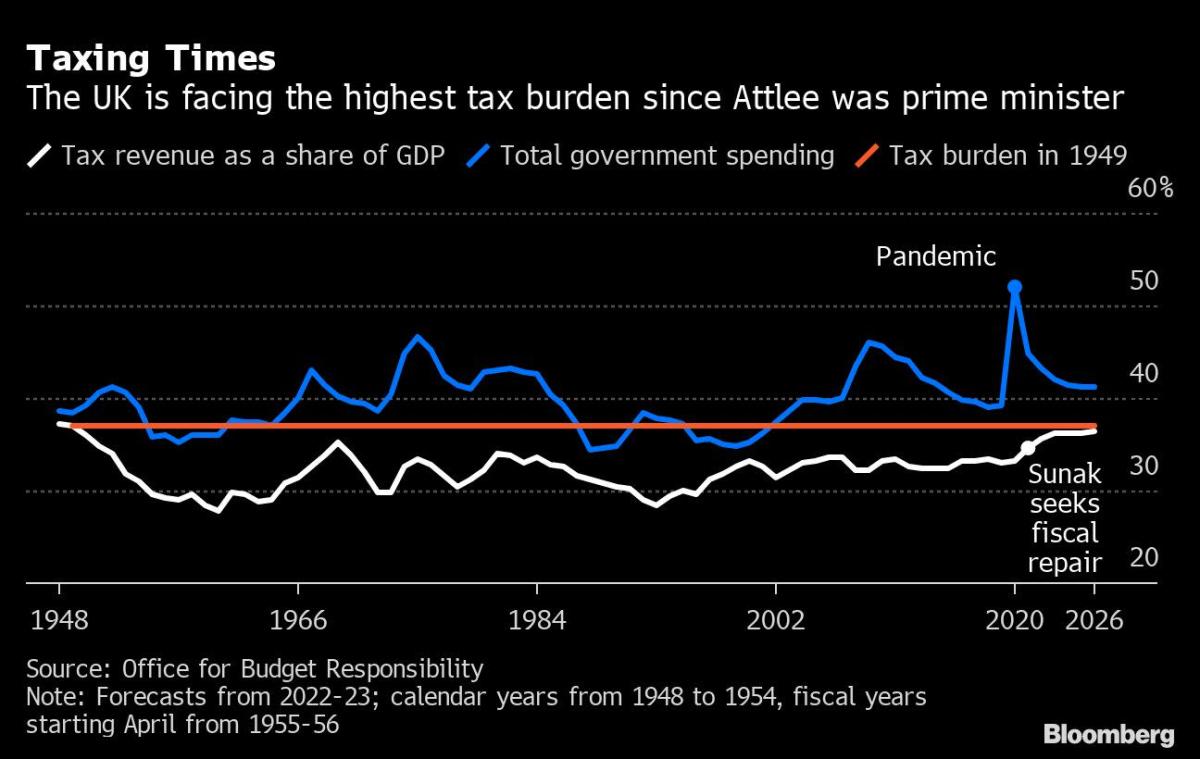
(Bloomberg) —
Most Read from Bloomberg
The contest to succeed Boris Johnson as UK prime minister is likely to become a battle over hand-outs for households, with limited interest in fiscal restraint.
Tax cuts and aid for families struggling with a surge in the cost of living are already at the heart of the political debate, and pressures for largess from the Treasury will only increase during the next few weeks.
By September, when the ruling Conservative Party aims to install a new leader, the government is likely to face strike threats from public sector workers demanding higher pay.
Increases in energy bills and rail fares will have been announced, and the Bank of England is widely expected to have raised interest rates by as much a half percentage point to grapple with rocketing inflation, which is at a 40-year high.
“The immediate challenges are rising inflation and the economic slowdown,” said Gerard Lyons, chief economic strategist at Netwealth and a former adviser to Johnson. “That requires a tighter monetary policy and a looser fiscal policy.”
Candidates for the top job include Foreign Secretary Liz Truss, former Health Secretary Sajid Javid and Defence Secretary Ben Wallace. Each are likely to appeal to grass-roots Conservative members with a combination of tax cuts and spending increases.
They’ll also want to maintain manifesto commitments left over from the 2019 election to “level up” less prosperous areas of the country outside London that helped deliver a landslide for Johnson.
All that means, more than a decade after the Conservatives came to power with promises to rein in government borrowing, talk of austerity is unlikely to form a major part of any candidates’ pitch.
“If we didn’t have this interim situation, the argument would be tax cuts on fuel and energy, a suspension of the corporation tax increase next year and help for households through an income tax cut,” Lyons said.
The political instinct to splash out Treasury cash contrasts with the central bank’s aim to tighten monetary policy in order to get a grip on inflation. Investors expect the BOE to raise rates rapidly, delivering more half-point increases by the end of the year in addition to the one in August.
Both business leaders and the Treasury’s Office for Budget Responsibility have warned Conservatives against a big splurge. The OBR said this week the budget is on an “unsustainable” path, requiring tax increases and spending cuts for years.
Johnson’s legacy may well be a state that spends and taxes much more than Tory traditions would suggest. Candidates are already falling over themselves to commit to lowering the UK’s tax burden, which ex-Chancellor Rishi Sunak increased to the highest level since the 1940s.
Sign up for the New Economy Daily newsletter, follow us @economics and subscribe to our podcast.
Tom Tugendhat, who is gathering support among MPs, wrote in The Daily Telegraph on Friday that “taxes are too high.” He said he would reverse the recent increase in payroll taxes and cut fuel duty under plans to create a “low-tax, high-growth economy.”
Nadhim Zahawi, the new chancellor who is a potential candidate, has said “nothing is off the table – I will look at every which way we can support hardworking families.”
He has signaled he would scrap next year’s increase in corporation tax from 19% to 25% to ease the cost of doing business in an attempt to spur lackluster economic growth, and increase the temporary 5p cut in fuel duty.
Other front-runners including Truss have made it clear in the past they favor tax cuts. Even Sunak has tried to position himself as a tax-cutting Tory, although his record in office may prove a serious handicap.
Jacob Rees-Mogg, the Brexit opportunities minister, on Thursday said Sunak “was not a successful chancellor — he was a high tax chancellor.”
Another option under consideration is a temporary reduction in sales tax on the grounds that it would both reduce costs for households and mechanically lower inflation. Before Johnson resigned, his office was looking at the proposal.
“Much of the calculation will revolve around trying to select a candidate that appeals to a wide cross-selection of the electorate; including former red wall seats, as well as the South of England and the larger cities,” said Saltmarsh Economics’ David Owen.
“As far as the likely policy mix is concerned, this all tilts the argument further in favor of a looser fiscal stance, and higher rates.”
Easier fiscal policy will come on top of support ladled out during the coronavirus pandemic that lifted public debt to a peacetime record. Sunak has already provided £37 billion of support for households this year, including a £15 billion package in late May only partly offset by a windfall tax on energy producers.
However, the weeks over which the leadership contest will run are likely to be peppered by calls for further giveaways. Public sector workers are clamoring for a pay settlement that was due in April, threatening a summer of strikes if no deal is reached. The government’s guidance for 3% rises will not come close.
Nurses are asking pay rises of 5% above inflation. Teachers are not satisfied with offers of 9% for new starters and 5% for existing staff. Barristers have rejected a 15% pay settlement. Like rail workers, they have already been on strike and are threatening more action.
Although Johnson said his caretaker government would not make any big fiscal decisions, new commitments may be unavoidable. A 40% increase in energy bills and a potential double digit increase in rail fares will be unveiled in August, alongside a Bank of England interest rate hike.
Candidates will inevitably have to address the issues, according to Benjamin Nabarro, an economist at Citigroup. The backdrop, he said, “suggests a contest dominated by the cost of living.”
Lyons said, “There has to be a sea change in UK economic thinking where Treasury orthodoxy — that the UK is a structurally low growth economy — is put back in its box. Fiscal conservatism and a growth agenda are not either/or. If you get growth up, you bring debt to GDP down.”
Read more:
Most Read from Bloomberg Businessweek
©2022 Bloomberg L.P.




